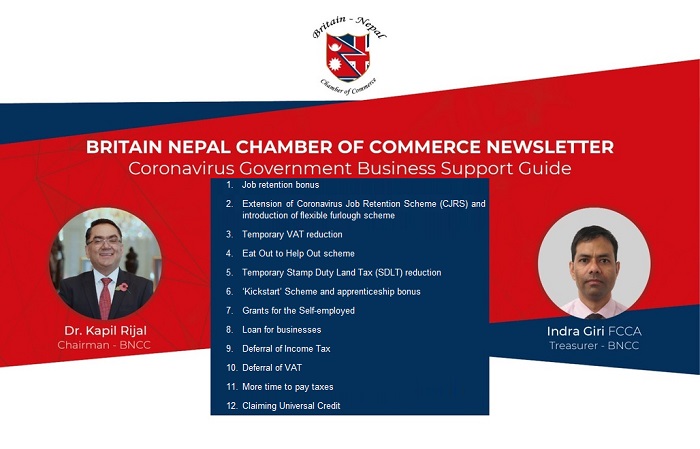Covid-19 Help for Businesses

The Coronavirus (COVID-19) pandemic and associated shutdown has significantly affected many businesses. Many businesses may be suffering in terms of cash flow and face enormous uncertainty about the future for their businesses.
Since March 2020, a number of measures have been announced and implemented and the official guidance has evolved. The UK Government has announced further measures in the recent budget to help businesses and workers mitigate the economic disruption caused by the Covid-19 pandemic.
In this article, we will be discussing following issues which will help you understand regarding the additional Government help available for small businesses.
- Job retention bonus
- Extension of Coronavirus Job Retention Scheme (CJRS) and introduction of flexible furlough scheme
- Temporary VAT reduction
- Eat Out to Help Out scheme
- Temporary Stamp Duty Land Tax (SDLT) reduction
- ‘Kickstart’ Scheme and apprenticeship bonus
- Grants for the Self-employed
- Loan for businesses
- Deferral of Income Tax
- Deferral of VAT
- More time to pay taxes
- Claiming Universal Credit
- Job retention bonus
The British government has announced a one-off bonus for employers of £1,000 for each employee that they bring back from furlough and who they continue to employ until the end of January 2021. This is an incentive for employers to keep on employees when the Coronavirus Job Retention Scheme (CJRS) ends at the end of October 2020.
Employees who are brought back must earn at least £520 per month (on average) between the end of CJRS and 31 January 2021. Payments of the bonus will be made from February 2021.
- Extension of Coronavirus Job Retention Scheme (CJRS) and introduction of flexible furlough scheme
In May 2020, the government announced that the CJRS will remain open until the end of October. It also announced some changes to the CJRS scheme.
No new employees can be furloughed from 1 July 2020 and no new employers can use the CJRS from that date.
Prior to 1 July 2020, furloughed employees were not permitted to undertake work for or on behalf of the employer’s organisation or any organisation or associated with the employer’s organisation whilst on furlough. From 1 July, employers can bring furloughed employees back to work for any amount of time and any shift pattern, while still being able to claim CJRS grant for the hours not worked. The government will pay 80% of wages up to a cap of £2,500 for the hours the employee is on furlough, as well as employer National Insurance.
For August, the government will pay 80% of wages up to a cap of £2,500 for the hours an employee is on furlough and employers will pay employer’s NICs and pension contributions for the hours the employee is on furlough.
For September, the government will pay 70% of wages up to a cap of £2,187.50 for the hours the employee is on furlough. Employers will pay employer’s NICs and pension contributions and top up employees’ wages to ensure they receive 80% of their wages up to a cap of £2,500, for time they are furloughed
For October, the government will pay 60% of wages up to a cap of £1,875 for the hours the employee is on furlough. Employers will pay ER NICs and pension contributions and top up employees’ wages to ensure they receive 80% of their wages up to a cap of £2,500, for time they are furloughed
Employers will continue to able to choose to top up employee wages above the 80% total and £2,500 cap for the hours not worked at their own expense if they wish. Employers will have to pay their employees for the hours worked.
- Temporary VAT reduction
In the Summer Economic Update, the Chancellor announced a temporary VAT reduction for certain supplies of hospitality, hotel and holiday accommodation, and admission to certain attractions. The following supplies will be charged at 5% instead of 20% from 15 July 2020 to 12 January 2021:
Food and non-alcoholic beverages sold for on-premises consumption, for example in restaurants, cafes and pubs.
Hot takeaway food and hot takeaway non-alcoholic beverages.
Sleeping accommodation in hotels or similar establishments, holiday accommodation, pitch fees for caravans and tents, and associated facilities.
Admissions to the following attractions, if they are not already eligible for the cultural VAT exemption:
- theatres, concerts, cinemas
- circuses, fairs, amusement parks
- zoos
- museums, exhibitions
Businesses will also have to decide whether to adjust their selling prices to reflect the reduction in VAT, as there is no obligation to do so. It is a commercial decision that may be affected by the cost or inconvenience of changing price lists, for example on printed menus.
- Eat Out to Help Out Scheme
This scheme is designed to stimulate demand in restaurants and pubs as they reopen after the shutdown. A business will have to register to participate. It can then offer a discount of up to 50% of the cost of food and non-alcoholic drink per person on sales made from Monday to Wednesday throughout August 2020. The discount is capped at £10 per person per meal. The government will reimburse the business for the discounts given to customers. Money received from the government under the scheme will count as ‘takings’ in the normal way, so it will be subject to VAT (at 5%, or 1/21 of the gross amount) and to income tax or corporation tax as revenue. There is no limit to the number of times customers can use the offer during August but it needs to be noted that alcohol and service charges are excluded from the offer.
Registration for the scheme began on 13 July 2020. You cannot make a claim yet. The system to claim reimbursements will be available on 7 August 2020. It will close on 30 September 2020.
You must wait 7 days from registration to make your first claim. HMRC will pay eligible claims within 5 working days. You will be able to submit claims on a weekly basis.
- Temporary Stamp Duty Land Tax (SDLT) reduction
The temporary increase in the SDLT threshold for residential properties means that there will be no SDLT on the purchase of a residential property in England or Northern Ireland between 8 July 2020 and 31 March 2021, if the total paid for the property is up to £500,000. As these rules are more generous than the existing rules for first time buyers, this new rule will apply instead until 31 March 2021. The additional 3% for ‘second properties’ will still apply though, so there will be a 3% charge on the purchase of second homes or buy-to-lets costing up to £500,000.
- ‘Kickstart’ Scheme and apprenticeship bonus
The Kickstart scheme provides an incentive for employers to provide six-month work placements for those aged 16 to 24 who are claiming universal credit.
The funding will cover the full cost of the relevant National Minimum Wage for 25 hours per week, as well as the cost of employer National Insurance Contributions and auto-enrolment pension contributions.
There will be no cap on the number of placements and the scheme will be open to funding applications from August 2020, with the first jobs expected to begin in the autumn.
There is also a new bonus for employers to hire apprentices over the next six months. From August 2020 to 31 January 2021, any firm that hires a new young apprentice aged 16 to 24 will receive £2,000 per apprentice, while those that hire new apprentices aged 25 and over will be paid £1,500. These payments will be in addition to the existing £1,000 incentive the government already provides for new 16 to 18-year-old apprentices and those aged under 25 with an education, health and care plan. It means that employers could receive up to £3,000 for hiring 16 to 18-year-old apprentices while this incentive scheme is in operation.
- Grants for the Self-employed
The Government will provide funds directly into the bank accounts of Self-employed individuals whose businesses have been adversely affected by the COVID-19 pandemic.
The Government is providing two tranches of grants under the scheme called Self-employment Income Support Scheme (SEISS).
The first SEISS grant pays 80% of your average monthly profits, as calculated from your tax returns, up to £2,500 per month. The grant application process opened on 13 May 2020 and ended on 13 July 2020.
This second SEISS grant will pay 70% of your average monthly profits, as calculated from your tax returns, up to £2,190 per month. The grant application process will open in August 2020, but the exact timing hasn’t been announced yet.
In order to receive this taxable grant, you must meet all these conditions:
- have traded as Self-employed in 2019/20 and are still trading (or would trading if it were not for the business disruption caused by COVID-19)
- you expect to continue to trade in 2020/21
- you receive more than half of your taxable income from self-employment, even if you also hold an employed position.
- you are registered with HMRC as Self-employed and submitted a tax return for the tax year 2018/19; if you haven’t submitted your 2018/19 tax return yet, you can still qualify if you submit it by 23 April.
- your average taxable profits must be less than £50,000 per year; if your profits are £50,000 or more you will receive no SEISS grant at all. HMRC will work out how much grant you will receive based on your tax returns for the three years to 2016/17 to 2018/19. If you started trading during that period HMRC will only use the periods for which you traded to calculate the grant. This scheme will not cover anyone who started trading on or after 6 April 2019.
- Loan for businesses
In order to help businesses through this difficult time, the Government has launched three different loan schemes to help small, medium-sized and larger businesses.
Bounce Back Loans to micro and small businesses
The Bounce Back Loan Scheme opened on Monday 4 May, to provide loans of between £2,000 and £50,000 to businesses who apply online. No repayments will be required in the first 12 months and the Government will also cover any fees and interest accruing in that first year. The interest charged on these loans will be set at 2.5% p.a. and the term of the loans will be up to six years. The loans are 100% backed by a Government guarantee, so there is no need for the business owner to provide collateral or to prove that the business will be viable once the coronavirus crisis is over. However, the loans will be provided by the banks, not directly by the Government. You should apply directly to you own bank for the Bounce Back Loan and the bank.
Loans for small and medium sized businesses
Coronavirus Business Interruption Loan Scheme (CBILS) is delivered by the British Business Bank. It is a temporary scheme to support primarily medium-sized businesses in accessing bank lending and overdrafts. The Government will provide lenders with a guarantee of 80% on each loan (subject to a per-lender cap on claims) to give lenders confidence in continuing to provide finance to SMEs. The Government will not charge businesses or banks for this guarantee. The scheme will support loans of up to £5 million, with repayment terms of up to 6 years. Businesses can access the first 12 months of that finance interest-free and charge-free, as the Government will cover the first 12 months of interest payments and any lender-levied charges.
To be eligible for this loan, the business needs to UK based, has turnover up to £45 million per year and has been adversely affected by the coronavirus pandemic.
There is also a different type of loan scheme available for large businesses with turnover over £45 million per year.
- Deferral of Income Tax
The next big Income Tax payment deadline is 31 July 2020. If you pay at least £1,000 of tax with your Self-assessment tax return, the payment due on 31 July is half of your estimated tax bill for 2019/20. But this year you can defer that payment until 31 January 2021, without being charged interest for late paid tax. You don’t have to apply to HMRC, as it won’t be demanding the tax due. However, if you normally pay your Income Tax by direct debit, you should cancel that direct debit with your bank, as HMRC can’t do that for you. If the direct debit remains in place, the tax will be collected as shown on your tax statement. This tax payment deferral applies to anyone who has to make payment of Income Tax on account by 31 July 2020, including employees who need to pay tax on other income such as rent or dividends. If you don’t want to delay paying the tax due on 31 July, you don’t have to, you can pay by electronic transfer or direct debit as normal. Paying the tax now will avoid a larger amount becoming due by 31 January 2021.
- Deferral of VAT
All VAT registered businesses can enjoy an automatic deferment of their VAT payable in the period from 20 March to 30 June, to help them manage cash flow during the pandemic. The VAT that is deferred will have to paid to HMRC on or before 31 March 2021. HMRC will not charge interest on the deferred VAT payments and default surcharges will not be charged for late payments due before 30 June 2020.
- More time to pay taxes
The Government has introduced an immediate deferral of upcoming VAT and Income Tax payments due in the next three months, but the other business taxes such as PAYE and Corporation Tax remain payable on the due dates. HMRC is willing to enter ‘Time to Pay’ (TTP) arrangements where businesses or individuals are struggling to pay tax bills on their due dates. There are no set rules as each TTP agreement is arranged on a bespoke basis. However, HMRC must be confident that the arrears will eventually be paid; it will not enter a TTP agreement if it thinks that the taxpayer will never be able to pay the arrears of tax. Generally, TTP arrangements involve tax liabilities being deferred, without penalties, and paid over a period of up to a year, with fixed, agreed repayment schedules. It is imperative that the payment dates are not missed. If they are, the TTP arrangement is likely to be ended by HMRC, with the full amount of tax outstanding becoming immediately due and, potentially, penalties may be payable. TTP arrangements lasting over a year are only agreed in exceptional circumstances, although the Coronavirus pandemic may mean that HMRC will be more amenable to such longer scheduling of repayments.
- Claiming Universal Credit
If you don’t qualify for a Government grant under the Self-Employed Income Support Scheme (SEISS), or your employer has stopped paying your wages, you should consider claiming Universal Credit. This is a state benefit which is gradually replacing all current claims for Working and Child Tax Credits, but it also covers housing benefit and job seekers allowance. You can claim Universal Credit if you are under state pension age and living in Great Britain. The initial claim is made online (www.gov.uk/apply-universal-credit), but if you are claiming as a Self-employed person you will also need to attend an interview with a work coach. However, during the Coronavirus shutdown this interview will be conducted by telephone.
The amounts paid under Universal Credit are being increased from 6 April 2020 by £20 per week. All Self-employed claimants are normally assumed to make a minimum amount of income from their business which is referred to as the ‘minimum income floor’. However, this minimum has been temporarily suspended for all claimants affected by the Coronavirus shutdown. This means that every Self-employed person can now access Universal Credit at a weekly rate equivalent to Statutory Sick Pay received by employees. The Universal Credit claim will be paid in respect of the first day of the claim, but the money may still take up to five weeks to start to arrive. In this period, you can apply for an advanced payment, which will be deducted from the benefit when it does arrive.
We encourage Nepali businesses in the UK to contact us if they need any help or advice. Besides promoting bilateral trade and British investment in Nepal, the BNCC is happy to provide any possible support to nepali businesses in the UK.
Dr Rijal is President and Mr Giri is Treasurer of the Britain Nepal Chamber of Commerce (BNCC). This article has been prepared based on information gathered from the UK government website (www.gov.uk) as well as various other accountancy and business magazines.



















Facebook Comments